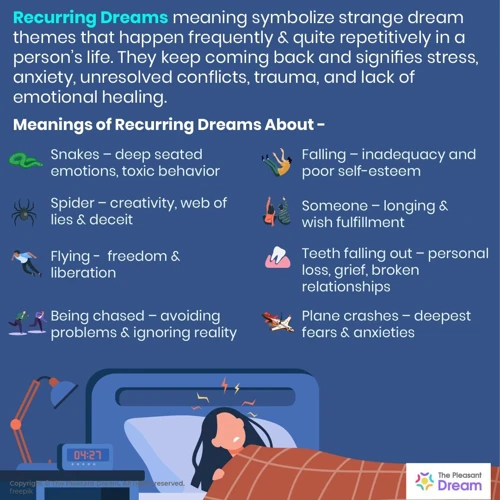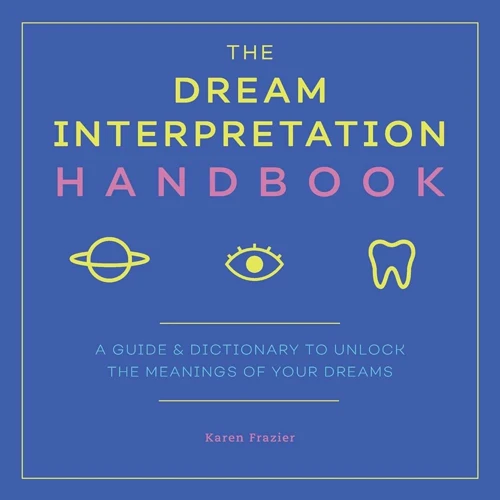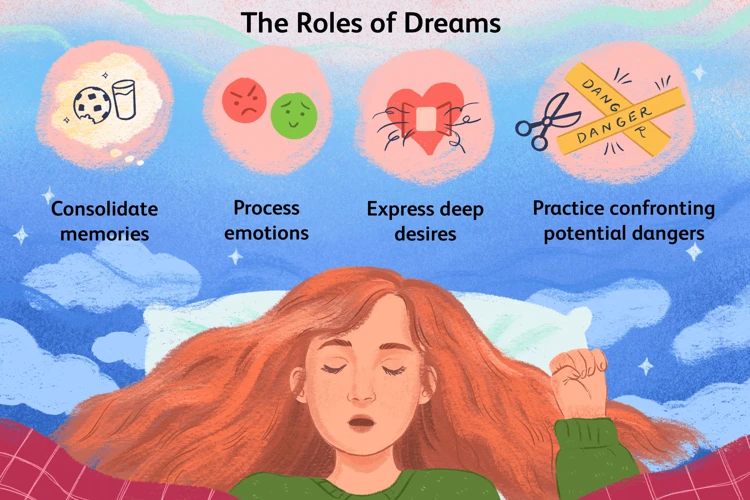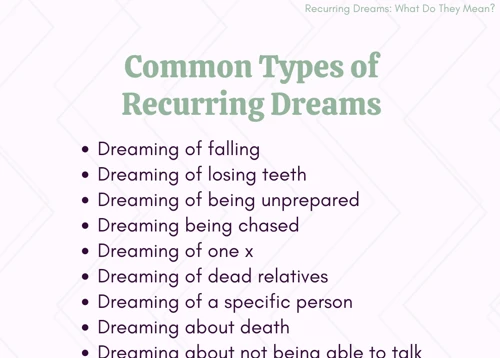Have you ever found yourself waking up in a cold sweat, only to realize that you’ve had the same dream again? Recurring dreams can be both intriguing and perplexing, leaving us with lingering questions about their meaning and significance. In this article, we will delve into the fascinating world of recurring dreams and explore the common themes that often arise. By understanding the patterns and symbols within these dreams, we can gain valuable insights into our subconscious mind and uncover hidden aspects of ourselves. So, grab a cup of tea and join us on this journey of exploration into the mysterious realm of recurring dreams.
What are Recurring Dreams?

Recurring dreams are a fascinating phenomenon that occurs when an individual experiences the same or similar dream repeatedly. These dreams might have slight variations in details or settings, but the overall theme or narrative remains consistent. Unlike regular dreams that fade away upon waking, recurring dreams linger in our memories, leaving us pondering their significance. They can occur over a period of days, weeks, months, or even years. Many theories have been proposed to explain the occurrence of recurring dreams, such as unresolved emotional issues, trauma, or subconscious desires. Some experts believe that recurring dreams serve as a means for our subconscious mind to communicate important messages or highlight unresolved conflicts. These dreams often contain common symbols or themes that are deeply rooted in our psyche. By interpreting these symbols and exploring the hidden meanings behind recurring dreams, we can gain valuable insights into our own unconscious mind and emotions. To better understand the theories and interpretations of recurring dreams, you can read more here.
Importance of Analyzing Recurring Dreams

Analyzing recurring dreams is crucial for several reasons. Firstly, these dreams often hold deep symbolic meanings that can provide valuable insights into our subconscious mind. By understanding the hidden messages within these dreams, we can gain a better understanding of our emotions, desires, and unresolved conflicts. Secondly, recurring dreams can serve as a mirror to our waking life, reflecting areas of our lives that may need attention or change. By paying attention to the consistent themes or patterns in these dreams, we can identify areas in our lives where we may be stuck or experiencing recurring challenges. Thirdly, exploring the meanings of recurring dreams can be a powerful tool for personal growth and self-discovery. The process of analyzing these dreams can lead to increased self-awareness and provide an opportunity for healing and growth. It allows us to uncover aspects of ourselves that may have been buried or neglected. To delve deeper into the hidden meanings of recurring dreams, you can explore more here. Additionally, understanding the role of recurring dreams in psychological interpretation can provide further insights, which you can read about here.
Common Themes in Recurring Dreams

Recurring dreams often exhibit common themes or motifs that occur across various individuals. These themes can be both captivating and unsettling, offering glimpses into our deepest fears, desires, and anxieties. One common theme is the sensation of falling, which may symbolize a lack of control or a fear of failure. Another recurring theme is being chased or attacked, which can represent feelings of vulnerability or the need to confront unresolved issues. Flying or soaring in dreams is another frequent theme, signifying a desire for freedom, empowerment, or liberation. Teeth falling out is yet another prevalent theme, reflecting issues related to self-image, communication, or insecurity. Dreams of being naked in public often evoke feelings of vulnerability, shame, or a fear of being exposed. Missing transportation reveals concerns related to missed opportunities or a fear of being left behind. Being late or unprepared for an exam is a recurring dream that symbolizes feelings of inadequacy or a fear of judgment. Water-related dreams, such as floods or drowning, often signify emotional turbulence or the need for emotional release. Understanding these common themes in recurring dreams can provide valuable insights into our emotional landscape and aid in the interpretation of their significance.
Falling
Falling is a common theme in recurring dreams that leaves us feeling a mix of fear, anxiety, and uncertainty. In these dreams, we often find ourselves plummeting from great heights without any control or means of stopping. The sensation of falling can be vivid and realistic, causing our hearts to race and our bodies to jolt awake. While the experience itself can be distressing, the interpretation of falling dreams can have various meanings. For some, falling dreams symbolize a loss of control or a fear of failure in waking life. It may reflect a sense of insecurity or a perceived lack of stability in our personal or professional lives. On a deeper level, falling dreams can also signify a profound transformation or a need to let go of something that no longer serves us. It is essential to consider the context and emotions surrounding the dream to gain a clearer understanding. Exploring the hidden messages behind falling dreams can help us address our fears and work towards finding balance and stability.
Being Chased or Attacked
Being chased or attacked is a common theme that frequently appears in recurring dreams. These dreams often evoke intense emotions of fear, panic, and vulnerability. The sensation of being pursued by someone or something can be alarming and unsettling, even though it is happening within the realm of dreams. The entity chasing or attacking us can take various forms, such as a person, animal, monster, or even an abstract force. The symbolism behind being chased or attacked in dreams can be linked to a range of underlying factors. It may reflect feelings of being overwhelmed or pursued by external pressures in our waking life. It could also signify unresolved conflicts or unresolved issues that we are trying to escape from. In some cases, being chased or attacked may represent our own fears, insecurities, or self-doubts that we are trying to confront. By examining the specific details and emotions associated with these dreams, we can gain deeper insights into the areas of our life that may require attention or resolution. Understanding the hidden meanings behind dreams of being chased or attacked can empower us to confront our fears and seek the necessary solutions in our waking life.
Flying or Soaring
Flying or soaring is a common theme that often appears in recurring dreams. It is a dream experience that evokes a sense of freedom, liberation, and empowerment. In these dreams, individuals find themselves effortlessly gliding through the air, defying the laws of gravity. The sensation of flying can be both exhilarating and surreal, leaving a lasting impression upon waking.
One possible interpretation of flying dreams is that they symbolize a desire for freedom and control in waking life. It may suggest that the dreamer is seeking liberation from constraints, whether they be emotional, physical, or societal. Flying represents a sense of overcoming obstacles and rising above challenges, giving the dreamer a sense of empowerment and confidence.
Another interpretation is that flying dreams may indicate a need for a different perspective or a desire for a higher understanding of a situation. It could signify a longing for escape from the mundane or a yearning for spiritual or intellectual growth. The act of soaring through the sky gives the dreamer a vantage point from which to see the world with a fresh, expanded viewpoint.
However, it is important to note that the meaning of flying dreams can vary depending on the individual’s personal experiences and feelings associated with the dream. Some people may experience fear or anxiety while flying in their dreams, which could indicate a lack of control or a fear of taking risks in their waking life. On the other hand, for others, flying dreams may evoke feelings of joy, excitement, and adventure.
To gain a deeper understanding of the hidden meanings behind flying dreams, it can be helpful to keep a dream journal and reflect on the emotions and circumstances surrounding these dreams. Exploring these dreams with the help of a dream therapist or psychologist can also provide valuable insights into the underlying emotions and experiences that may be influencing recurring dreams of flying or soaring.
Teeth Falling Out
The dream of teeth falling out is a common and unsettling experience that many people have. This dream typically involves a sensation of one’s teeth becoming loose, falling out, or crumbling. While the imagery itself can be distressing, it is important to note that this dream does not typically signify impending dental issues or indicate a literal interpretation. Instead, it is believed to be symbolic of deeper psychological meaning.
One possible interpretation of this dream is that it symbolizes a loss of power or control in one’s life. Teeth are associated with our ability to communicate, bite, and chew, so the dream of them falling out may represent difficulties in expressing oneself or feeling unable to effectively assert one’s desires or opinions in waking life. It could also reflect feelings of vulnerability or a fear of being judged by others.
Another interpretation suggests that the dream of teeth falling out may represent a fear of aging or mortality. Teeth are associated with youth and vitality, so their loss in a dream can evoke anxieties about growing older or facing one’s mortality. It may serve as a reminder to take care of one’s physical and emotional well-being.
In some cases, this dream may arise during times of transition or change. It could symbolize a need for adaptation or adjustment in response to new circumstances. It may also indicate an underlying feeling of instability or insecurity.
Understanding the specific meaning of a dream in which teeth are falling out can depend on the individual’s personal experiences and emotions. By reflecting on the context and emotions surrounding the dream, individuals can gain insight into their subconscious fears, insecurities, or concerns. Exploring these underlying issues may provide an opportunity for personal growth and self-awareness.
Being Naked in Public
Being Naked in Public is a common theme that frequently occurs in recurring dreams. This dream scenario often evokes feelings of vulnerability, embarrassment, and shame. In these dreams, individuals find themselves in public places, such as school, work, or a crowded street, completely naked and exposed for all to see. The dreamer may feel a sense of panic, desperately trying to find something to cover themselves or hide from the judgmental eyes of others. This recurring dream symbolizes the fear of being exposed or judged for one’s true self. It reflects feelings of insecurity, low self-esteem, and a fear of being scrutinized or criticized by others. It may also indicate a fear of revealing one’s true thoughts, emotions, or vulnerabilities in a social or professional setting. Some psychologists suggest that this dream theme can arise from a fear of rejection or a desire to be accepted and validated by others. It may stem from past experiences of feeling exposed or humiliated in public, such as giving a speech or presentation, or from a fear of being seen as inadequate or imperfect. To learn more about the hidden meanings behind this recurring dream theme, explore the article on hidden meanings in recurring dreams.
Missing Transportation
Missing transportation is a common theme that often appears in recurring dreams. These dreams revolve around finding oneself at a bus stop, train station, or airport, only to realize that the desired mode of transportation is missing or has already departed. This theme can evoke feelings of frustration, anxiety, and helplessness. In some instances, the dreamer may be running late and desperately trying to catch the bus or train, but always missing it by a fraction of a second. Alternatively, they might arrive at a deserted station, waiting endlessly for a means of transportation that never arrives.
The meaning behind missing transportation dreams can vary depending on the individual’s circumstances and emotions. On a symbolic level, these dreams often reflect feelings of being left behind or missing out on opportunities in waking life. They may indicate a fear of not being able to keep up with the fast pace of life or a sense of being overwhelmed by responsibilities. In some cases, missing transportation dreams can be related to control issues, highlighting a fear of losing control or missing important events or milestones.
Psychologists suggest that missing transportation dreams may also stem from a fear of failure or a lack of direction in life. The dreamer may feel a sense of urgency to reach their destination but is constantly thwarted by external circumstances or their own internal obstacles. These dreams serve as a reminder to assess one’s goals, make necessary adjustments, and take proactive steps towards achieving them.
Understanding the underlying meaning of missing transportation dreams can be valuable in gaining insight into one’s subconscious mind. Keeping a dream journal and reflecting on recurring motifs and emotions associated with these dreams can aid in identifying patterns and making connections to one’s waking life. By addressing the root causes of these dreams, individuals can work towards finding solutions, setting goals, and ultimately overcoming the sense of missing out or being left behind.
To explore more about the psychological interpretation of recurring dreams, you can check out our article here.
Being Late or Unprepared for an Exam
Being late or unprepared for an exam is a common theme in recurring dreams that many people can relate to. These dreams often evoke feelings of anxiety, stress, and fear of failure. The dreamer may find themselves running through empty hallways, searching for their exam room, only to realize they have forgotten their books or haven’t studied at all. The pressure of being evaluated and the fear of not meeting expectations manifest in these dreams, reflecting the dreamer’s concerns about their abilities and performance in real life. These dreams may also arise during times of transition or important decision-making processes, where the dreamer feels uncertain or unprepared for upcoming challenges. The symbolism behind being late or unprepared for an exam may indicate the fear of judgment, the fear of not measuring up, or the fear of missed opportunities. It is important to recognize these recurring dreams as a reflection of our subconscious thoughts and emotions, and to use them as an opportunity for self-reflection and growth. Understanding and addressing these fears and insecurities can help alleviate the anxiety associated with these dreams and empower the dreamer to approach challenges with confidence and preparation in real life.
Water-related Dreams (Floods, Drowning, etc.)
Water-related dreams, such as floods, drowning, or being swept away by a current, are common themes that often recur in people’s dreams. These dreams can carry deep symbolic meanings and reflect our emotional state or subconscious fears. Water is a powerful symbol in dreams and can represent various aspects of our emotions, intuition, and subconscious mind. Drowning in a dream may signify overwhelming emotions or feeling overwhelmed in a particular situation. It could indicate a fear of losing control or being swallowed by our emotions. On the other hand, a dream about swimming or calmly floating in water can symbolize a sense of peace, emotional balance, or the ability to navigate through life’s challenges. Dreams about floods may represent a surge of overwhelming emotions or events in our waking life, signifying a need to address and release these pent-up feelings. Reflecting on the specific details and emotions experienced during water-related dreams can provide valuable insight into our emotional well-being and help us navigate through turbulent times.
Meanings and Interpretations

Meanings and interpretations of recurring dreams can vary greatly depending on the individual and their unique experiences and emotions. It’s important to remember that dreams are highly subjective and personal, so what may hold true for one person may not necessarily apply to another. However, certain common themes in recurring dreams have been identified and associated with specific meanings. For example, falling dreams are often linked to feelings of insecurity or a loss of control in waking life. Being chased or attacked in a dream may symbolize avoidance of a problem or a fear of confrontation. Flying or soaring dreams can represent a sense of freedom, liberation, or a desire to escape from restrictions. Teeth falling out dreams have been associated with anxiety or a fear of aging. Being naked in public dreams may reflect vulnerability or a fear of judgment. Missing transportation dreams often signify a sense of being unprepared or missing out on opportunities. Being late or unprepared for an exam dreams can stem from anxieties about performance or self-doubt. Water-related dreams, such as floods or drowning, can indicate overwhelming emotions or a need for cleansing and renewal. It’s essential to explore the personal context and emotions surrounding these recurring dream themes to obtain a more accurate interpretation. By examining the recurring patterns and symbols in our dreams, we can gain valuable insights into our subconscious mind and address underlying issues or emotions that may be affecting our waking life.
Psychological Perspectives on Recurring Dreams

Psychological perspectives provide valuable insights into the interpretation of recurring dreams. Let’s explore some of these perspectives:
1. **Psychoanalytic Perspective**: According to Sigmund Freud, recurring dreams are a manifestation of repressed emotions and unresolved conflicts. Freud believed that recurring dreams serve as a means for the unconscious mind to bring these issues to the surface. Through analysis and interpretation, individuals can gain a deeper understanding of their hidden desires and unresolved traumas.
2. **Jungian Perspective**: Carl Jung emphasized the collective unconscious and archetypes in his interpretation of recurring dreams. He believed that recurring dreams connect us to universal symbols and themes that are shared across cultures and time. By analyzing recurring dreams, we can gain insights into our personal as well as collective unconscious, helping us to achieve individuation and self-realization.
3. **Cognitive Perspective**: From a cognitive standpoint, recurring dreams may be a result of cognitive processing and memory consolidation. During sleep, the brain processes and organizes information from our daily experiences. Recurring dreams may indicate that certain experiences or memories are particularly salient or significant to us, causing them to reappear in our dreams.
4. **Emotional Regulation Perspective**: Some psychologists suggest that recurring dreams can serve as a form of emotional regulation. For example, individuals who experience recurring nightmares may be processing and working through past trauma or intense emotions. By reliving these experiences in the dream state, individuals may gradually desensitize themselves to the associated emotions and ultimately achieve emotional healing.
These psychological perspectives offer different lenses through which we can understand and interpret recurring dreams. By exploring these perspectives, we can gain a deeper understanding of ourselves and the messages our dreams may be trying to convey.
Tips for Dealing with Recurring Dreams
Dealing with recurring dreams can be both confusing and exhausting, but there are several tips and strategies that can help you navigate these recurring nocturnal experiences. Firstly, keeping a dream journal can be immensely helpful in identifying patterns and recurring themes in your dreams. By recording your dreams immediately upon waking, you can explore and analyze them later to uncover any hidden meanings. Additionally, practicing relaxation techniques before bed, such as deep breathing or meditation, can help calm the mind and reduce the likelihood of intense or negative dreams. Another helpful approach is to confront the content of the dream head-on during your waking hours. Consider journaling about the emotions and symbols within the dream and reflect on what they might represent in your waking life. Seeking out a therapist or dream interpreter can also provide valuable insights into your recurring dreams. They can offer guidance and facilitate a deeper understanding of the underlying emotions and experiences that may be triggering these dreams. Lastly, engaging in stress-reducing activities during the day, such as exercise or creative outlets, can promote better sleep and potentially lessen the influence of recurring dreams. Remember, dealing with recurring dreams is a personal and unique journey, so it’s essential to find the techniques and strategies that work best for you.
Conclusion
In conclusion, recurring dreams can provide us with a unique window into our subconscious mind. Through analyzing the common themes and symbols that appear in these dreams, we can uncover hidden emotions, unresolved conflicts, and aspects of ourselves that require attention. Falling, being chased, flying, teeth falling out, being naked in public, missing transportation, being late or unprepared for an exam, and water-related dreams are just a few examples of the recurring dream themes that people commonly experience.
While the specific interpretations of these dreams may vary from person to person, it is essential to remember that the meanings behind recurring dreams are highly subjective and personal. It is important to trust your own instincts and emotions when delving into the interpretations of your recurring dreams. Seeking guidance from a therapist or dream analyst can also provide valuable insights into the underlying psychological factors at play.
Ultimately, the exploration of recurring dreams offers us an opportunity for self-reflection and personal growth. By paying attention to the messages and symbols within our dreams, we can gain a deeper understanding of ourselves and address any unresolved issues or emotions that may be influencing our waking lives. So, the next time a recurring dream visits you in the night, embrace it as an invitation to explore the rich landscape of your inner world.
Frequently Asked Questions
Why do recurring dreams happen?
Recurring dreams can occur for various reasons, including unresolved emotions, trauma, or subconscious desires. They may serve as a way for our subconscious mind to communicate important messages or highlight unresolved conflicts.
Are recurring dreams common?
Yes, recurring dreams are quite common. Many people experience them at some point in their lives. Some individuals may have recurring dreams more frequently than others.
Can recurring dreams have different variations?
Yes, recurring dreams often have slight variations in details or settings while maintaining a consistent theme or narrative. These variations can provide additional insights into the underlying meanings of the dream.
Do recurring dreams have hidden meanings?
Yes, recurring dreams are believed to have hidden meanings. They often contain symbols or themes that are deeply rooted in our psyche. Exploring these symbols can help us gain a better understanding of our unconscious mind and emotions.
Can recurring dreams be related to past traumas?
Yes, recurring dreams can be linked to past traumas. They may serve as a way for our subconscious mind to process and cope with unresolved emotions or experiences from the past.
What should I do if I have recurring nightmares?
If you are experiencing recurring nightmares, it may be helpful to explore the underlying emotions or triggers connected to the dream. Keeping a dream journal, practicing relaxation techniques before bed, or seeking professional help can also aid in managing recurring nightmares.
Can recurring dreams be positive?
Yes, recurring dreams can have both positive and negative themes. Some individuals may experience recurring dreams that bring them a sense of joy, empowerment, or inspiration.
Can recurring dreams change over time?
Yes, recurring dreams can evolve and change over time. As we grow and experience new things, the symbols and themes within our dreams may also shift or transform, reflecting our changing subconscious mind.
Are recurring dreams worth analyzing?
Yes, analyzing recurring dreams can be worthwhile as they offer valuable insights into our subconscious mind and emotions. By understanding the patterns and symbols within these dreams, we can gain self-awareness and potentially resolve unresolved conflicts.
Can recurring dreams be influenced by daily life experiences?
Absolutely! Our daily life experiences, thoughts, and emotions can greatly influence our dreams, including recurring dreams. Stressful events, fears, or desires from our waking life may manifest in our dreams, shaping their recurring nature.








